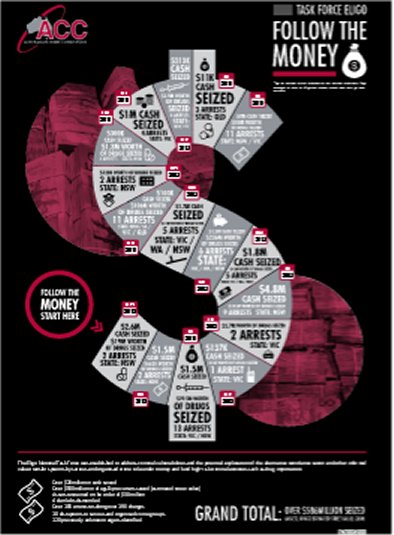The Australian Crime Commission has today unveiled a year-long covert money laundering investigation codenamed Eligo following a record $5.7 million cash seizure in Sydney at the weekend (Saturday, 18 January 2014).
The Eligo National Task Force, established in 2012 as an Australian Crime Commission-led special investigation into the use of alternative remittance and informal value transfer systems by serious and organised crime, has seized more than $580 million worth of drugs and assets, including $26 million in cash.
The task force has also disrupted 18 serious and organised crime groups and identified 128 criminal targets previously unknown to law enforcement. These criminal targets have been placed on the Australian Crime Commission’s National Criminal Target List, and include targets operating in more than 20 countries.
Australian Crime Commission acting Chief Executive Officer, Paul Jevtovic, said the task force was using criminal intelligence insights, including that of the United States Drug Enforcement Administration, to disrupt illicit international money flows, and to ‘harden’ the alternative remittance sector against serious and organised crime.
“Organised criminal groups are using complex and sophisticated money transfer structures in an attempt to legitimise their proceeds of crime,” Mr Jevtovic said.
“Non-traditional law enforcement measures aimed at disrupting and deterring organised crime groups from targeting Australia have been used. Through these new methodologies, new areas of focus, and new and more efficient ways of investigation, we’ve been better able to unearth an elaborate network of criminal activity, and remove half a billion dollars from the criminal economy—profits destined to line the pockets of criminals, and to further facilitate crime such as drug trafficking,” Mr Jevtovic said.
The task force comprises the Australian Crime Commission, the Australian Transaction Reports and Analysis Centre (AUSTRAC), the Australian Federal Police in partnership with the Australian Customs and Border Protection Service and State and Territory police.
Australian Federal Police Commissioner Tony Negus said Task Force Eligo was having a significant impact.
He said the high level of sophistication and international reach of these syndicates provides a disturbing picture of the transnational nature of serious and organised crime; “however these criminals are now firmly in our sight, and we will continue to target their activities to remove the incentive and reward for organised crime in this country.”
AUSTRAC Chief Executive Officer John Schmidt said the legitimate and cash intensive remittance sector, a key focus of the task force, is recognised internationally as a high risk of being exploited by serious and organised crime groups.
“The inherent risk of the sector—which provides an important service whereby Australians can send money anywhere in the world affordably and almost instantaneously—underlines the importance of maintaining a robust regulatory regime and continuing industry engagement and support,” Mr Schmidt said.
“Over the past two years AUSTRAC has taken regulatory action against 15 remitters. Importantly, the task force will continue to work with the alternative remittance sector and relevant industry bodies to build resilience and safeguard against such organised crime threats.”
During the investigation, Task Force Eligo also worked closely with the Drug Enforcement Administration by tapping into the agency’s global network and expertise in money laundering investigations.
Assistant Attaché to Australia Uri Shafir said the collaboration was yet another outstanding example of the successes achieved when international law enforcement agencies join forces in the fight against organised crime.
United States Ambassador to Australia John Berry offered his congratulations: “I’m proud that we have such strong law enforcement cooperation with Australia—together we are disrupting the international drug trade and preventing people from profiting from crime.”
The Eligo National Task Force has led to:
- the seizure of more than $26 million cash, including a record $5.7 million single
cash seizure in Sydney at the weekend (Saturday, 18 January 2014) - the seizure of illicit drugs with a combined estimated street value of more than
$530 million - the restraint of more than $30 million worth of assets
- the disruption of 18 serious and organised criminal groups/networks
- the identification of more than 128 targets previously unknown to law enforcement
- the arrests of 105 people on 190 charges
- the closing down of three commercial amphetamine laboratories, including one of
the largest and most sophisticated clandestine laboratory ever discovered by Victoria Police
in Sunshine, Victoria (October 2012) - the closing down of one of the largest urban hydroponic cannabis grow houses ever
discovered by the NSW Police Force in Port Botany, New South Wales (November 2013) - Western Australia’s $20 million seizure (cash, drugs, and assets) last week
(Thursday, 16 January) by WA Police.
Australien Money-Laundering Scam Funding Hezbollah ET AL



Pingback: Follow the Money | W-T-W
Pingback: Folgen Sie der Spur des Geldes | W-T-W